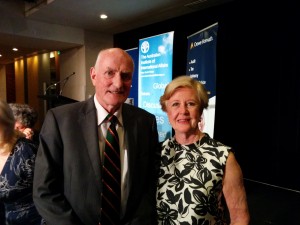Australia's Human Rights - Lost in Translation?
Gillian Triggs, Australia’s Human Rights Commissioner, was guest speaker at AIIA NSW’s 91st anniversary dinner at the Sydney Hilton on Thursday 26 November. She gave 120 guests a sombre and compelling account of the erosion of human rights in Australia and the diminution of checks and balances protecting our democracy.
She expressed concern at how some world leaders continued to conflate terrorism with border security, especially since the Paris terrorist attacks of 13 November; how Australian authorities continue to brand refugees as ‘outlaws’; and how we continue to hold about 3,609 people without trial or reprieve in Australia, on Manus and on Nauru, of which 205 are children. According to UN Rapporteurs, these detentions breach the Torture Convention and constitute ‘calibrated cruelty’.
Gillian recalled her attendance earlier in November at the Human Rights Periodic Review held every four years in Geneva. It was Australia’s turn to be reviewed. Over 100 countries raised their concerns about Australia’s human rights non-compliance. The list was long – a continuing gender pay gap, violence against women, the rate of juvenile indigenous incarceration (27 times the average), loss of momentum about constitutional recognition of indigenes, decline in employment of disabled workers, detention of the mentally ill, failure to ratify the Optional Protocol to the Convention against Torture (OPCAT), mandatory indefinite detention of refugees, and failure to assess 30,000 claims to refugee status.
More expressing puzzlement than anger, 70 states listed our treatment of asylum seekers and refugees as a primary concern. How could Australia, with its good past record on human rights and the rule of law, have sunk so low? Australia’s response was predictable and profoundly misleading – we stopped the boats and saved lives; and Australia was the third largest resettlement country within the UNHCR process, failing to mention that this so-called ‘lawful’ process applies to about 1% of 60 million seekers and displaced persons globally. Gone were the days, Gillian ruefully observed, when we could say ‘how dare Saudi Arabia, Qatar, Libya criticize our human rights record’. Now we are attracting the courteous but deep concerns of traditional allies such as the UK, Canada, the US, and powerful Asian counties like China, Japan and Indonesia.
How has it come to this? Over the past 15 years Australia has become increasingly isolationist and exceptional in its approach to protection of human rights. Our Constitution protects freedom of religion, property rights, the right to vote and trial by jury, but little more. Unlike every other common law country, Australia has no Charter or Bill of Rights. Core international human rights instruments form no part of Australian law and Australian courts are reluctant to apply international obligations or principles not legislated into domestic law by parliament. Compounding our isolation from international human rights jurisprudence, the Asia Pacific has no human rights law or regional court.
In summary, said Gillian, Australia has not developed the legal or parliamentary tools for protection of human rights that are available in comparable legal systems. With parliamentary support, the Executive government is therefore able to pass laws that threaten our democratic freedoms with apparent impunity.
However, not all is lost. First, in 2011, a Human Rights Parliamentary Scrutiny Committee was established. Considerations tend to be split down party lines, and most recommendations are not accepted by Government. But the Committee’s activities may create a culture of human rights among parliamentarians and public servants. Second is the existence and continued survival of the Australian Human Rights Commission. Established in 1986, its enduring strength is its independence from government. And third, the High Court has in at least two cases qualified the unconstrained rights of Parliament to give the Executive the power to detain.
But, concluded Gillian, perhaps the most powerful constraints are the cultural expectations of most Australians that our freedoms will be protected. We are quick to assert our liberties under the rubric of a ‘fair go’, a phrase that may be as close to a bill of rights in this country as we are likely to get.
Report prepared by Richard Broinowski
